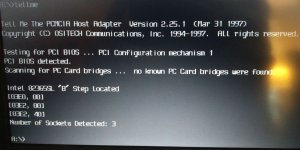kishy
Veteran Member
Hi folks
I once embarked upon a mission to better-document the Panasonic CF-25 (Pentium and Pentium MMX rugged notebooks). In the various research I did to put that mess together, I found multiple indications that the CF-25 would not assign resources to Cardbus cards...only 16 bit PCMCIA cards. My experience with a literal stack of these notebooks over the last few years has been consistent with that: a Cardbus card will be seen, and you may install drivers for it, but Windows 98 will say the hardware didn't get any resources. However, the notebook is equipped with an actual Cardbus controller, which makes it kind of silly that it would be equipped with the (presumably more expensive) Cardbus controller if the design couldn't accommodate the cards.
Having acquired my ThinkPad 760E, which is from that same time period (build date May '96), I've found that you cannot use Cardbus cards (only 16 bit PCMCIA) until you open the ThinkPad Configuration utility (Windows software; these settings are not exposed in the BIOS setup menu), explicitly enable Cardbus support, and further monkey with IRQ assignments until you get a workable result. Maybe this is common for period hardware, but bear in mind I was 6 years old when these were new, so my perspective is different.
The questions, therefore, are:
I'm going to try poking around with the First Aid, Setup, and Tools diskette images that Panasonic thankfully keeps on their website even to this day...but figured opening a dialogue wouldn't hurt either.
Edit: after some of the aforementioned poking around, this might be a case of "RTFM". Will post my findings once I can test with an actual CF-25. The question of what exactly has to happen here still stands though.
I once embarked upon a mission to better-document the Panasonic CF-25 (Pentium and Pentium MMX rugged notebooks). In the various research I did to put that mess together, I found multiple indications that the CF-25 would not assign resources to Cardbus cards...only 16 bit PCMCIA cards. My experience with a literal stack of these notebooks over the last few years has been consistent with that: a Cardbus card will be seen, and you may install drivers for it, but Windows 98 will say the hardware didn't get any resources. However, the notebook is equipped with an actual Cardbus controller, which makes it kind of silly that it would be equipped with the (presumably more expensive) Cardbus controller if the design couldn't accommodate the cards.
Having acquired my ThinkPad 760E, which is from that same time period (build date May '96), I've found that you cannot use Cardbus cards (only 16 bit PCMCIA) until you open the ThinkPad Configuration utility (Windows software; these settings are not exposed in the BIOS setup menu), explicitly enable Cardbus support, and further monkey with IRQ assignments until you get a workable result. Maybe this is common for period hardware, but bear in mind I was 6 years old when these were new, so my perspective is different.
The questions, therefore, are:
- What exactly is ThinkPad Configuration doing when you "enable Cardbus"?
- Is it possible that the Toughbook may be able to have [the above] done to it via software as well?
- Does anyone have first-hand experience successfully using Cardbus cards in a CF-25?
I'm going to try poking around with the First Aid, Setup, and Tools diskette images that Panasonic thankfully keeps on their website even to this day...but figured opening a dialogue wouldn't hurt either.
Edit: after some of the aforementioned poking around, this might be a case of "RTFM". Will post my findings once I can test with an actual CF-25. The question of what exactly has to happen here still stands though.
Last edited:

